About us
Our history

Music is a human document
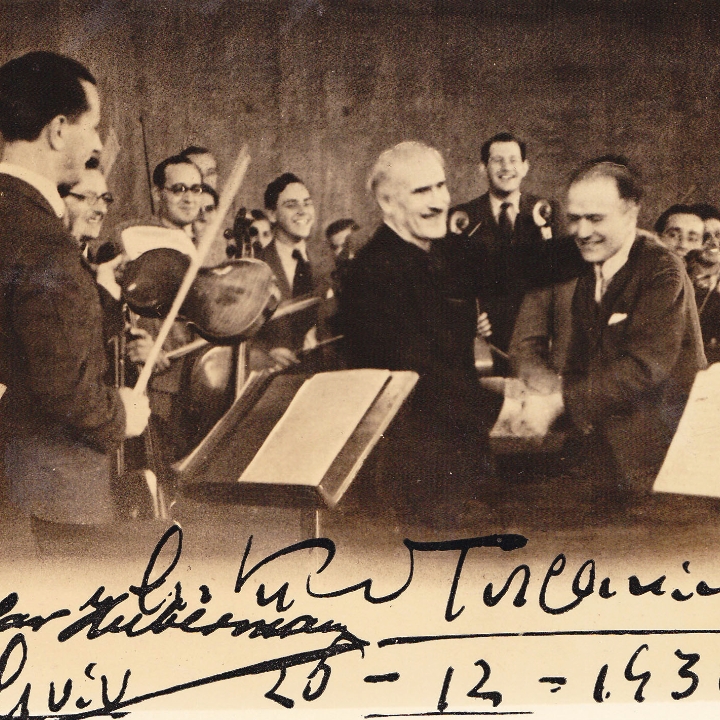
The IPO hones certain values.
When Toscanini took the baton to be the first conductor of this orchestra, it was his statement against racism.
As he raised his hand, he said
“This is for mankind.”
BEFORE 1948
In 1936, the world renowned violinist Bronislaw Huberman, had a dream of an orchestra in Palestine. There were those, amongst them David Ben Gurion, who laughed at this dream and felt that agriculture, military and a language should take centre stage. Huberman banged his fists on the table, and said,
“We must have an orchestra! We need to bring our culture with us, to this desert.”
He knew that the country needed more than the bones that he’d it up.
It needed a soul.
And with that his journey started; to the USA where he met amateur musician Albert Einstein, to Britain where he met Chaim Weizmann. Where he made the case to government for an orchestra in British mandate Palestine. Somehow they were able to get the British high commissioner to Palestine to give Huberman something priceless – the ability to issue certificates of entry into Palestine.
At the beginning it was hard to convince the musicians to leave the comfort and glamour of the magnificent concert halls in Europe to play in tents in the desert, but within a very short while, Huberman held the lifeline for so many musicians and their families as they were able to escape the fate of the large majority of European Jewry. And Toscanini led the orchestra in his fight against racism.
The Palestine Symphony Orchestra became the Israel Philharmonic Orchestra on the day that Israel became a state. And as they played Hatikvah at the official ceremony of the Declaration of Independence on May 14, 1948, it was heard across the world, carried over the radio waves for all to hear.
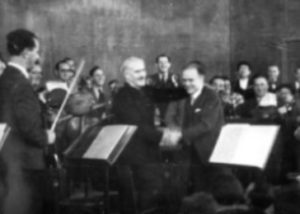
26 December 1936
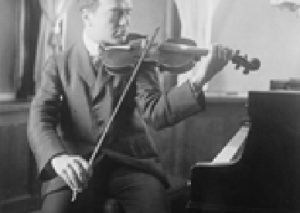
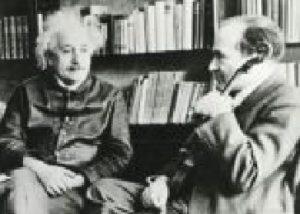
1947 - 1956
On 20 November 1948, a few days after Israel’s liberation, the IPO performed a moving concert on the dunes of Beer Sheba. Senior orchestra members remember the young Leonard Bernstein playing and conducting the orchestra before 5,000 soldiers, within earshot of the retreating Egyptian forces.
The orchestra would travel in armoured cars to besieged Jerusalem, raising the morale of civilians and soldiers alike.
Over this decade, and even while Leonard Bernstein was writing West Side Story, he would be travelling back and forth to conduct the orchestra in Israel. Bernstein would continue to be with the orchestra until 1988.
This was also the decade in which some of the world’s most renowned artists came to identify with the State of Israel through their relationships to the orchestra.
The orchestra had its first tour to the USA in December 1950, conducted by Koussevitzky, Bernstein and Izler Solomon, which brought much pride to the American Jewry. Later, the orchestra toured Europe, which was also exciting for the orchestra members and European audiences alike.
The orchestra’s first visit to the UK came in 1955, performing at the Royal Festival Hall and the Royal Albert Hall, with conductors Paul Klecki and Paul Paray, alongside violin soloist, Isaac Stern.
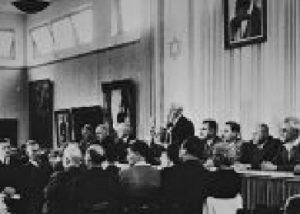
Independence ceremony on May 14, 1948
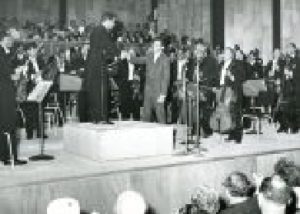
in Be’er Sheva
1947 - 1956
The people of Israel took the greatest pride in the orchestra and listened and as in Fiddler on the Roof,
it was a lifeline to their traditions as Israelis came from different backgrounds and cultures.
The main event of this decade was the inauguration of the orchestra’s home, the Mann Auditorium, Tel Aviv. The initiator and principal benefactor was IPO American Friend Frederic R. Mann. The orchestra, which until then had been performing before thousands of subscribers in the small and tattered “Ohel Shem” Hall, seating 620 people, moved into its new hall with 2,800 seats. As a result, the orchestra’s subscribers grew into the tens of thousands.
The third time also brought many of the world’s great artists. A crack in the Russian Iron Curtain allowed artists such as violinist David Oistrakh and cellist Msislav Rostropovich to join the orchestra for the first time.
This was also the decade in which several young and promising artists made their debuts to much success: violinists Itzhak Perlman and Pinchas Zukerman, pianist Daniel Barenboim and conductor Zubin Mehta, who continues his close connection with the orchestra to this day.
Throughout this decade the orchestra recorded with conductors George Solti and Lorin Maazel.
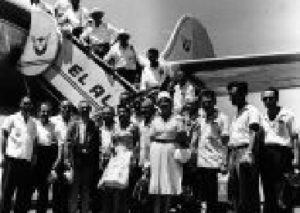
1967 - 1977
The fourth decade was undoubtedly one of the most heroic decades in the orchestra’s history. On the eve of the Six Day War, with our neighbours threatening to annihilate us, a renowned conductor stopped conducting in the midst of a concert series and left Israel. The soloists of that series, soprano Roberta Peters and tenor Richard Tucker, were defiant and stayed. The war broke out and Zubin Mehta arrived from Europe, becoming Music Director to the IPO in 1969
He was later joined by Daniel Barenboim and cellist Jacqueline du Pre, who were married in liberated Jerusalem. Leonard Bernstein conducted Mahler’s “Resurrection” Symphony in one of the IPO’s most moving concerts ever, in the Amphitheatre on Mount Scopus (July 1967). Isaac Stern was the soloist in this concert, and all of the nation’s heads of state were present. The IPO performed Verdi’s Requiem in Bethlehem, conducted by Mehta, and for IDF soldiers in Sharm-e-Sheikh, conducted by Shalom Ronly-Riklis. Jascha Heifetz and Gregor Platigorsky returned to Israel for performances with the orchestra, and were enthusiastically received.
For the first time, in 1971, the IPO was invited to take part in the prestigious European festivals in Salzburg, Lucerne, and Edinburgh. Loud arguments were made as to whether or not the orchestra should play in Berlin; finally, the decision was to play. The German audience responded enthusiastically to Mahler’s Symphony No. 1 and demanded an encore. Mehta declared: “Hatikvah,” and thus our national anthem was played 500 meters from the Reichstag, the site from which the orders for the massacre of the Jewish people came. In 1973 the Yom Kippur War broke out, and the orchestra continued to perform for IDF soldiers, from the Golan Heights to Sinai.
The great pianist Arthur Rubinstein, who had lost his eyesight, made his final recording with the orchestra: Brahms’ First Piano Concerto conducted by Zubin Mehta (April 1976).
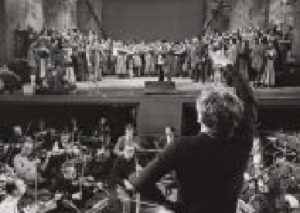
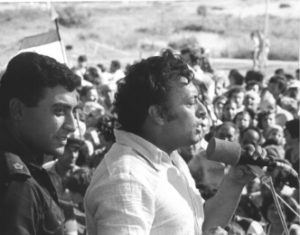
Fence” on the Lebanese border, with an audience of
Israelis and Lebanese on both sides of the fence.
1978 - 1986
This decade was filled with extraordinary events. In 1982, the worlds greatest vioilinists came to celebrate 100 years since the birth of the orchestra’s founder, Huberman. In 1986 the IPO celebrated its Jubilee with an exceptional festival featuring renowned conductors and soloists; Leonard Bernstein wrote his work “Jubilee Games” especially for the occasion.
A short while thereafter the orchestra celebrated 100 years since the birth of Arthur Rubinstein with distinguished pianists who travelled to Israel to perform in memory of the great maestro.
In this decade Zubin Mehta was appointed Music Director for Life, and excitedly declared, “I will stay as long as the players want me.”
This was a decade of successful tours. The orchestra received enthusiastic reviews of Beethoven’s “Fidello” and Mahler’s 5th Symphony with Mehta and Bernstein’s “Kaddish” Symphony in memory of the Holocaust victims, conducted by the composer in Berlin. Bernstein took the orchestra to Europe, USA, Mexico and Japan, and Zubin Mehta conducted a moving concert at the “Good Fence” on the Lebanese border, with a mixed audience of Israelis and Lebanese on both sides of the fence.
The IPO recorded many works for major labels: Sony, EMI, Deutsche Gramophone, Teldec and others, conducted by Mehta, Bernstein, Walter Weller and Raphael Kubelik.
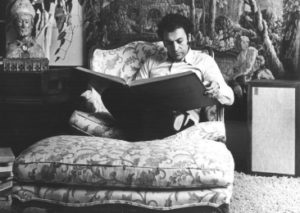
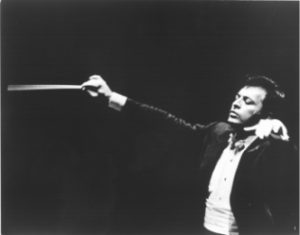
1987 - 1996
This decade was also adorned with exciting moments. The IPO embarked on its first tour of Poland, and how symbolic it was: an orchestra founded by musicians who escaped the Nazis at the last moment, performing in the country which suffered the greatest human loss in the German death camps. It felt like a proclamation: “We are here, and the Jewish people, culture and heritage cannot be annihilated.”
The gates of the USSR were also opened to the orchestra, which performed with conductor Zubin Mehta and soloist Itzhak Perlman. The connections between Russia and Israel were immense. It was the only dream of the Jews from this country to immigrate to Israel—a dream that came true and led to many new immigrant musicians joining the orchestra’s ranks. The orchestra had a wonderful reception on its first tour of China. The orchestra also toured India, the homeland of Zubin Mehta, with 200 million people watching!
In 1988 the IPO named Leonard Bernstein Laureate Conductor of the IPO, for his 40 years of activity with the orchestra, and the celebrated musician shed a tear upon receiving the honorary title.
Conductor Kurt Masur made his Israeli debut, and after an enthusiastic reception, toured with the orchestra in the USA. In 1992 he received the title of Honorary Guest Conductor. Other moving events were the world premieres in May 1987 of Noam Sheriff’s “Mehaye Hamelin” (“Ressurection of the dead”), depicting the revival of the Jewish people, performed at the inauguration of the Jewish-Historic Museum Amsterdam, in the presence of the Queen of Holland and many European Prime Ministers, and the performance of Sheriff’s Spanish Passion” in Toledo (1991), in a concert conducted by Zubin Mehta dropped everything and rushed to conduct the orchestra amidst the Scud missile attacks. 25 members of the orchestra spent the war as reservists in the IDF. James Levine made his IPO debut in festive and successful concerts. In April 1996 the IPO celebrated Mehta’s 60th birthday in an exciting and eventful tour of the USA, in which the American Friends of the IPO proved yet again their continuing support of the orchestra.
Under the auspices of the IPO Foundation, associations of friends to aid the orchestra were founded throughout the world. The orchestra continued to “change form” with senior members, the pillars of the orchestra, retiring, new young blood ran through its veins, many coming from the ranks of the Young Israel Philharmonic.

concert tour to Poland, Russia, Latvia and Hungary.
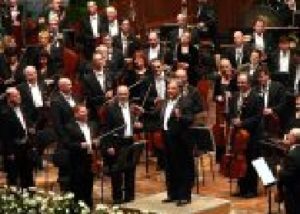
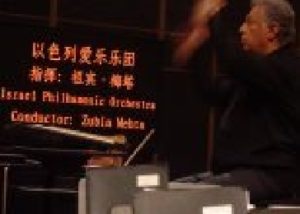
televised concert in Mumbai, Zubin Mehta’s
hometown, was seen live by more than 200 million
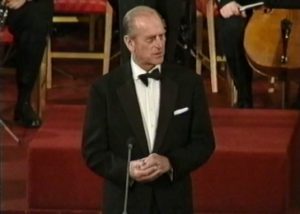
Governor of the Israel Philharmonic from 1998 until his
retirement from all royal duties and
public engagements in 2017
1997 - 2006
In the seventh decade, the Israel Philharmonic Orchestra’s fortunes reflected the political turmoil of the Middle East. In the days of the Oslo Accords, a period of unprecedented optimism in Israeli society, the IPO saluted Israeli’s own finest artists and performers, Moshe Wilensky, Sasha Argov, Naomi Shemer, Nurit Hirsch, Esther Ofarim and Yoni Rechter, with special concerts. Bestselling recordings featuring the IPO accompanying Isareli artists Achinoam Nini, David D’Or and Yehudit Ravitz appeared alongside those of the “Mediterranean” sound by Greek greats Dalares and Glikeria.
Zubin Mehta was asked to lead the IPO in a historic concert bringing Palestinian and Jewish children together in the concert hall. Orchestra members shuffled between Bethlehem in the Palestinian Authority and Beit Shemesh, a typical Israeli development town, to prepare 500 youngsters for an orchestra concert. Finding “neutral territory” for children from Deheshe, a refugee camp, and Beit Shemesh was not an easy task, but when Mehta finally brought the baton down in Beethoven’s Seventh Symphony at the Jerusalem YMCA, 500 children had an unforgettable experience. This event sparked the founding of “Keynote,” the education department of the orchestra. Through our support, the Keynote programme continues to develop, embracing 20,000 youngsters annually, from kindergarten to university.
With the outbreak of the Second Intifada, last minute cancellations threatened each and every concert. Foreign artists, frightened by suicide bombers and unrelenting reports in the press, abandoned the orchestra and the Israeli audience when their commitment was most needed. The IPO audience responded by showing unfailing loyalty, filling the Mann Auditorium nightly. New friends were found: Valery Gergiev, Fazil Say, George Pehlivanian, Gustavo Dudamel, Joshua Bell, Maxim Vengerov, and Lang Lang. Many veteran artists never cancelled: Kurt Masur, Yoel Levi, Daniel Oren, Rafael Frunbeck de Burgos and, of course, Maestro Mehta. As the new millennium began, the IPO also began to re-invent itself. New series were created nearly every season in order to present a more attractive product to the audience: “Jeans,” a late-night informal concert; Friday afternoon matinee; 7:00 in the Evening; “Intermezzo” – coffee and concert of Friday morning for both Tel-Aviv and Jerusalem audiences.
Maestro Mehta, who during this decade was also Artistic Director of the Bayerische Staatsoper, created a valuable bridge to Tel-Aviv University by founding the Buchmann-Mehta School of Music, an academy where the Philharmonic’s leading players are coaching tomorrow’s musicians.
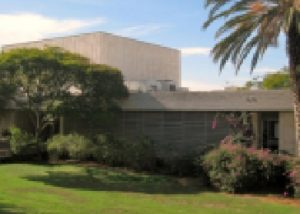
University established the Buchmann-Mehta School of
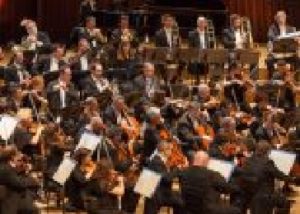
chamber ensembles traveled throughout the Northern
region of Israel to perform concerts.

education and community engagement program of
the Orchestra.
2007 - THE HERE AND NOW
On the Orchestra’s 70th birthday, an audience of 24,000 fans celebrated for three weeks! Such is the importance of the Orchestra to the people of Israel.
The orchestra and Maestro Mehta were honoured at the Knesset in Jerusalem. The descendants of the original 65 members of Bronislaw Huberman’s Orchestra were invited to celebrate with the likes of Valery Gergiev, Daniel Barenboim, Radu Lupu, Pinchas Zukerman, Gil Shaham, Gustavo Dudamel, Evgeny Kissin, Mischa Maisky, Christoph von Dohnanyi, Yefim Bronfman, Maxim Vengerov, Murray Perahia and Yuja Wang.
The magnificent renovation of the concert hall, Heichal Hatarbut, which was originally built in 1957 marked a new era and became known as the Charles Bronfman Concert Hall.
The orchestra continued to perform abroad from China to India and beyond. Concerts such as New Year’s Eve celebrations in the People’s Republic of China in 2007 was a highlight. Zubin Mehta and the orchestra offered the rapturous Chinese audience the soul and sound of Israel. A momentous week festival consolidated the deep friendship with India , in honour of the centenary of the birth of Maestro Mehta’s father, Mehli Mehta.
In 2011, to mark its 75th birthday, the orchestra visited 18 cities and gave 21 concerts in 30 days. Paris, London, Madrid, Milan and Bucharest were just some of the high points. The tour will also undoubtedly be remembered for the disruption caused by a small but well-organised group of anti-Israel demonstrators, which took place during the orchestra’s “Proms” concert in London’s Royal Albert Hall, which was broadcast live on the BBC. Mehta, soloist Gil Shaham and the Philharmonic never turned around from their purpose while the entire audience at the Royal Albert Hall resounded “get out! get out!” at the demonstrators who were then escorted out of the hall.
On October (2019), Zubin Mehta passed the baton to Lahav Shani as music director of the orchestra.
The IPO entered the digital age and managed to survive Covid, through a series of concerts, playlists, and other digital content with the help of our friends, like Helen Mirren, Hans Zimmer, Bette Midler and Rona Lee Shimon.
And now, history is in our hands…
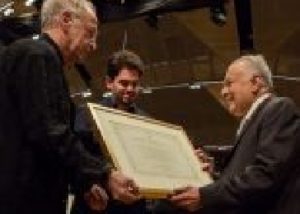
Lahav Shani is named Music Director Designate.







